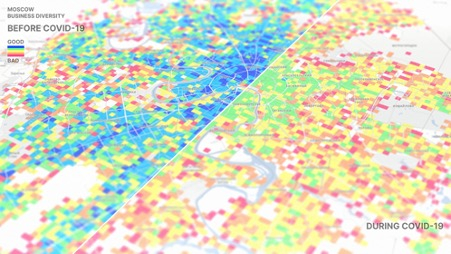

Moscow Mobility: How movement in cities changed during the pandemic
The pandemic has greatly influenced the lives and daily routine of the city-dwellers. As for the Muscovites, compared to March, in April-May there was a general decrease in the people’s mobility – home office and going out for shopping or walking the dog became the only types of interaction with the environment.
With the use of cell phone data we analyzed the decrease in the people’s mobility during the quarantine, how much time people spent at home and which areas of the city they chose for leisure activities.
Background
Shifts in mobility patterns have been monitored since the early days of the COVID-19 outbreak. Thus, the University of Exeter in the UK reported that in March the mobility levels dropped by about 50-70% compared to before the pandemic, and the Statistics Estonia published the analysis showing that on average people began to spend 20 hours per day at home.
Along with that, mobile apps that collect user geolocation data presented their own mobility indices – Citymapper correlated the number of trips planned with the app (in the ‘Get Me Somewhere’ mode) to the trips taken (in the ‘GO’ mode) during the lockdown in comparison to the typical usage period. Trips include movements by public transport, taxis, bicycles, and walking. The results show that from early March to mid-April the Moscow Mobility Index decreased from 0.98 to 0.16. The calculations are based on Citymapper data alone but nonetheless the change is dramatic.
Under these circumstances, people start paying attention to what surrounds them – street design, commercial diversity and accessibility of green areas make an important part of the new normal life in our residence areas.
Full analysis here.
This analysis is part of a series of publications resulting from FIABCI's partnership with Habidatum.
About Habidatum
Habidatum is a software and data analytics company, assisting policymakers and businesses in understanding the hyper-dynamic urban environment through advanced analytics of diverse data sources driven by machine learning and interactive visualization.
Habidatum operates as a gateway between the professional communities that require data-driven insights and data carriers.
The company was founded in 2014 by a collaboration between professional urban planners and digital designers. Since 2014, the company has worked in more than 20 cities globally including London, New York, Moscow, Dubai, Singapore, Pune, Denver, and Miami.


























































































































































































































































































































































![[Webinar Summary] COVID-19: What lies ahead for the Real Estate Industry?](/uploads/news/9i1w05plq2ksbcswuyj5ze2nr.png)































































































